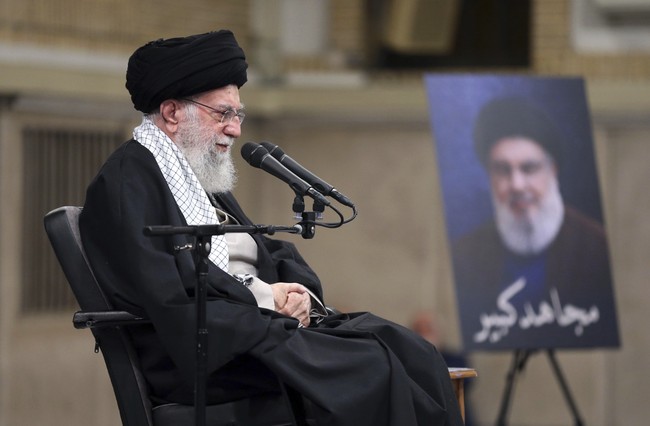
Good enough? Not for me, and likely not for Benjamin Netanyahu. But neither of our votes count much these days, it seems.
The same day that Donald Trump declared the “Neocon era” was over, the Iranians decided to make him an offer that Trump might not refuse. The mullahs’ representatives presented Steven Witkoff with a proposal that would surrender its uranium enriched to weapons-precursor levels and agree to limit enrichment in the future to only low levels for civilian use. They would open all of their nuclear facilities to IAEA inspectors and close down any efforts to make military use of nuclear technology. In return, the US would have to lift all sanctions immediately:
Iran is ready to sign a nuclear deal with certain conditions with President Donald Trump in exchange for lifting economic sanctions, a top adviser to Iran’s supreme leader told NBC News on Wednesday.
Ali Shamkhani, a top political, military and nuclear adviser to Iranian Supreme Leader Ayatollah Ali Khamenei, is one of the most senior Iranian officials to speak publicly about the ongoing discussions.
He said Iran would commit to never making nuclear weapons, getting rid of its stockpiles of highly enriched uranium which can be weaponized, agree to enrich uranium only to the lower levels needed for civilian use, and allow international inspectors to supervise the process, in exchange for the immediate lifting of all economic sanctions on Iran.
Asked if Iran would agree to sign an agreement today if those conditions were met, Shamkhani said, “Yes.”
Hmmmm. This certainly sounds good, but we have heard similar claims from Iran in the past too. In fact, it sounds nearly identical to the Joint Comprehensive Plan of Action (JCPOA) that Barack Obama signed in 2015. In that “Iran deal,” as it became known in the US, Iran also agreed to surrender its low- and medium-enrichment uranium and to limit future enrichment to 3.67% for the next 15 years. They also promised to dismantle two-thirds of their centrifuge capacity. It turned out that Iran complied at the facilities that had already been identified, but had still hidden a covert nuclear weapons program from the IAEA, and had not dismantled its centrifuges as required. Over the years, it also became clear that Iran had not revealed all of its nuclear-development facilities as required, one of which came to light this month.
The Iranians never did take those promises seriously. The JCPOA front-loaded all of the economic benefits to Iran in return for — at best — a delay in the development of an Iranian nuclear weapon. Tehran took the money and did little more than pay lip service to the JCPOA while continuing to develop nuclear weapons. And perhaps more importantly, Tehran used the massive economic benefit from the JCPOA not to make peace with the West but to fuel its proxy wars in the region, including and especially the Houthis, which are now firing missiles at Israel on a regular basis and nearly stopped global shipping in the Red Sea for the past nineteen months.
So why should we expect it to be any different now? Some of us clearly don’t, but the situation has changed from 2015 in significant ways. Iran has lost most of its forward strategy in the region now; Bashar al-Assad is living a decadent exile in Moscow, and Syria is in the hands of a hostile force that appears ready to align with the US and Israel. Hezbollah is a shell of its former self, its lines of communication to Iran all but gone; it may not survive in Lebanon much longer, let alone present any kind of formidable front-line defense for Iran. Hamas is dying, and the Houthis are at best an annoyance to the West in the long run. Trump’s decision to park a squadron of B-2 Stealth bombers in Diego Garcia made the mullahs wake up and smell the coffee, so to speak, about their precarious position. Without better economic progress, the mullahs may find that the B-2 squadron was the lesser of the threats facing the regime, as their populace is sick and tired of 46 years of pariah status and the privations it creates.
Maybe that makes the Iranians more willing to cut a real deal this time. However, one can argue that the same set of circumstances could make the mullahs even more desperate to get their hands on a nuclear weapon as a means to ensure their survival and to negate at least the external threats that could bring them down. Plus, lifting all of the sanctions up front puts us in the same position as the JCPOA did — allowing the mullahs fresh revenue streams to conduct their proxy wars and internal repression in exchange for vague promises to behave in the future, likely with no reliable verification possible.
It’s literally a Wimpy offer: I’ll gladly pay you Tuesday for a hamburger today.
A deal with the mullahs may still be possible, but this one’s not worth the effort. Any deal should impose actual verification, and require Iran to renounce its terrorism and proxies entirely and immediately. Otherwise, we’ll be right back at Square One again … and Israel would likely be right back to another October 7.












